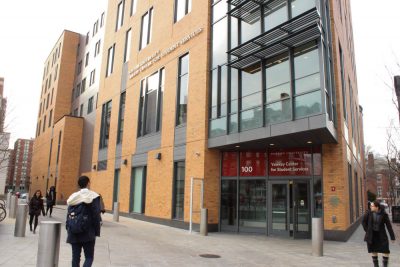
Efforts to rename Yawkey Way, a street along the Boston Red Sox’s Fenway Park, have raised questions at Boston University about whether the Yawkey Center for Student Services should also be renamed.
The street’s name was changed from Jersey Street to Yawkey Way in 1977 to honor late Red Sox owner Tom Yawkey. Boston’s Public Improvement Commission will be meeting next Thursday to decide whether or not the street will be renamed.
Those in favor of renaming the street accuse Yawkey of having a racist past and point to the fact that the Red Sox were the last Major League Baseball team to sign an African-American player as one form of evidence. Opponents of the name change say Yawkey eventually changed his ways and that the charity work he contributed to Boston should not be forgotten.
BU President Robert Brown wrote in an email that the university has been following the discussions about Yawkey Way and has received “a number of queries” regarding the Yawkey Center.
The Center is home to several resources within the BU community, including the College of Arts and Sciences Center for Writing, CAS Academic Advising and the Educational Resource Center.
Brown said the Yawkey Center carries its name because of the support the Yawkey Foundations have contributed to BU. He said that support has helped many students land internships throughout the years.
“The Yawkey Foundations are recognized — and I would hope appreciated — for their generous, ongoing support of hospitals, educational programs, and, more generally, underserved communities,” Brown said. “It seems to me it is appropriate to acknowledge the enduring commitments made by the Foundations to much-needed, transformative programming.”
BU spokesman Colin Riley shared a similar view, writing in an email that the Yawkey Foundations support a wide span of diverse programs in Boston.
“The Foundations’ gift to BU is specifically (and creatively) designed to support nonprofit agencies that otherwise would not have funds to offer internships,” Riley said. “So, the nonprofits benefit by having interns that they would [otherwise] not be able to employ and BU students benefit from the experience they gain from those internships.”
Christopher Walsh, director of the CAS Writing Program, said that while the CAS Center for Writing is located in the Yawkey Center, he has not heard any opposition from students or faculty regarding the Yawkey Center’s name.
He said there is a good impulse behind what the Yawkey Foundations do, and while some people may have a “knee-jerk response,” there are different routes the university could take other than changing the Center’s name.
“Maybe the right way to proceed is not changing the name but acknowledging through educational means,” Walsh said. “Through lectures, or even a plaque or whatever, that acknowledges the racist history associated with this name or this person but also gives a fuller picture.”
Several BU students said they support a name change, while others said they prefer not to alter the legacy associated with the Yawkey.
Ali Husain, a CAS freshman, said he believes building names are “semi-important” and that they show who or what a school may value. Husain, who has used the resources provided at the Center before, said he does not believe the name is a big issue.
“I think because [of] the intention to name it after the foundation, they had a good intention,” Husain said. “Even if the man turned out to have [had] flaws and not be that great, I don’t think it’s of that much concern because it’s more like it’s named after the ideas that he represented.”
Andrew Habberstad, a sophomore in the Questrom School of Business, said a name change would be “removing history,” and while it could be for the better, there would likely be some hesitance from people against the idea.
“Ultimately, I think it comes down to who has the operational hold over the foundation,” Habberstad said. “It’s just a tough gray area because it deals with the elimination of history — the elimination of a big, prominent figure’s name in a past society.”
Tiffany Makovic, a CAS senior, said a building’s name is only as important as the value people assign to it and that she had not previously known who or what inspired the Yawkey Center’s name.
“I think if most people associate Yawkey with the person instead of the foundation, then that would be a problem,” Makovic said. “If more people were aware of the foundation and the sort of things that it provides, then in that case, I would say that it’d be fine to keep the name.”












Educating people about Tom Yawkey is exactly what is needed. Bill Nowlin’s biography is excellent. It should be left up to the student’s themselves on how to judge a person as a racist, but as Nowlin states, he found no evidence that Tom Yawkey was a personal racist even looking specifically for it. This Yawkey Way situation is a perfect case study for students, but I personally believe its just John Henry’s pettiness run amok.